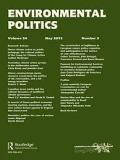
The alleged capacity of Payment for Environmental Services (PES) to reach conservation policy goals, while reducing poverty in a cost-effective manner, makes it an extremely attractive development instrument for policymakers and international funding agencies. This article reconstructs the process of envisioning and building the National PES Strategy in Colombia. It reveals how this conservation policy has resulted from the mobilisation of the transnational/national PES epistemic community and its globally expanding discourse. The influential PES network generates internally defined standards of success that proceed without reference to empirical evidence as to the impacts of the implemented policies. PES adoption is influenced by regulatory instruments’ unsatisfactory outcomes, the ways in which market-environmentalist models induce profound indifference towards on-the-ground policy impacts, the discursive power and alignment properties of the PES policy epistemic community, and financial and political pressures by international banks and environmental NGOs.
Climate change is increasingly recognised as a global crisis, but solutions have so far focused on scientific and economic options, rather than on the human and gender dimensions. Despite the fact that marginalised and poor people, including women, are affected first and hardest by climate change, evidence indicates that women’s views, needs and participation are excluded from the design and planning of climate change responses, including major policies. Moreover, women are often perceived primarily as victims, and not as equal contributors of knowledge and skills in disaster risk, adaptation and mitigation strategies.
This brief is based on a research project carried out by Practical Action Consulting with support from the Institute of Development Studies, commissioned by and supported by the Climate and Development Knowledge Network (CDKN), to provide evidence on the advantages and challenges of integrating a gender dimension into climate compatible development strategies in urban settings, with a focus on Peru, India and Kenya. Although considerable evidence exists pertaining to rural areas, significant knowledge gaps can be found in relation to climate compatible development and gender in urban areas. The research attempts to respond to the following four questions:
Gender is an important driver of vulnerability to climate risks, and a key factor to consider in developing effective policy responses to climate change and development challenges. In recent years, there have been a number of efforts to support gender equality as part of responses to climate change. However, gaps remain in drawing lessons from such efforts. This is especially true when it comes to understanding how gender relations affect people’s ability to adapt in urban settings. Given the impact that climate change and extreme weather events are having on urban populations around the world, there is a clear need to provide more evidence to inform climate change and development interventions.
This brief is based on a research project carried out by Practical Action Consulting with support from the Institute of Development Studies,commissioned by and supported by the Climate and Development Knowledge Network (CDKN), to provide evidence on the advantages and challenges of integrating a gender dimension into climate compatible development strategies in urban settings, with a focus on Peru, India and Kenya. Although considerable evidence exists pertaining to rural areas, significant knowledge gaps can be found in relation to climate compatible development and gender in urban areas. The research attempts to respond to the following four questions:
